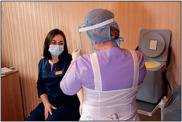COVID-19 vaccination in Ukraine – The Lancet Infectious Diseases
[ad_1]
Widespread reluctance to vaccinate in Ukraine threatens the success of the country’s COVID-19 vaccination program. Edward Holt reports.
Ukraine has finally started its COVID-19 vaccination program – months after other European countries – following what critics say are delays due to political struggles and corruption allegations. But even at the start, the government admitted that the country faces a potentially serious obstacle to the success of the program: widespread reluctance to immunize both among the general population and among health workers. Speaking at a public event in Kiev in early February, President Volodymyr Zelensky said: “Having solved the problem of vaccine supply, we are faced with a new problem: the mistrust of the vaccine. ” regarding vaccinations and the refusal of a large part of the population to obtain [COVID-19] vaccine.”
There also appears to be widespread reluctance to immunize among health workers across the country. Sylwander said UNICEF had information that up to 40% of Ukrainian health workers are reluctant to get vaccinated. Svitlana Guk, head of the Respiratory Medicine Center at Feofania Clinical Hospital in Kiev, said Infectious Diseases The Lancet: “There is a fairly serious hesitation with regard to vaccines [among health-care workers]. This is due to the lack of reliable information on how vaccines are developed, work and the quality of their production, as well as guarantees that second doses will be delivered on time. It’s not that doctors consider the vaccine itself to be bad, but that there is a lack of professional information. [about the vaccines]. She added that it was essential that as many people as possible, including health workers, be vaccinated to ensure the population’s immunity and reduce the chances of new strains of the virus emerging. It is not known to what extent this reluctance could affect the roll-out of the immunization program, in which health workers will be among the first to receive doses. The vaccination will be voluntary, but President Zelensky said he believes health workers have no right to refuse vaccination.
Item Info
Publication history
Identification
DOI: https://doi.org/10.1016/S1473-3099(21)00156-0
Copyright
© 2021 Elsevier Ltd. All rights reserved.
ScienceDirect
Access this article on ScienceDirect
[ad_2]

